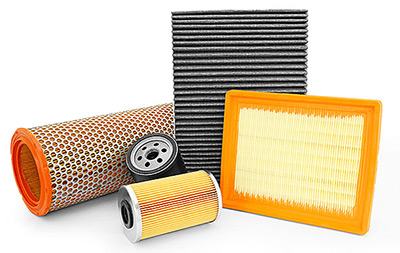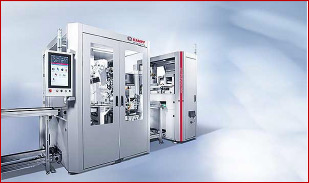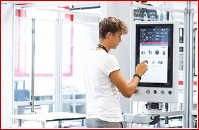Filtech 2023 High-performance sealing foams, adhesive systems and casting resins and automated production systems.
Grafenberg, Germany. The international RAMPF Group is presenting reactive polymers and automated dispensing solutions for filter production at Filtech 2023 from February 14 to 16 in Cologne, Germany – Hall 8 / Booth E29.
For filter manufacturers, RAMPF offers a comprehensive product and service portfolio for sealing, cast- ing, and bonding:

Reactive resin systems based on poly- urethane, epoxy, and silicone from RAMPF Polymer Solutions

Automated dispensing systems for the processing of single-, dual-, and multi- component reactive resin systems from RAMPF Production Systems
Air and HEPA filters as well as oil and hydraulic filters are manufactured in a wide variety of designs and must always perfectly fit the application. With materials and processing technology form a single source, RAMPF is maximizing both the quality of filters and the cost-effectiveness of their manufacturing pro- cess.
> Sealing foams: Before being installed in ventilation systems, air filter elements are sealed using RAMPF’s RAKU® PUR liquid and thixotropic FIPFG sealing foams. The polyurethane systems exhibit first-class physical properties as well as short processing times. Sealing foams for special requirements are also available, including systems with antibacterial properties according to DIN EN ISO 846 (11/2020).
> Conductive casting resins: For filter elements that are used in ATEX environments (explosion-proof environments), RAMPF offers soft (Shore A 85) and hard (Shore D 80) systems. These exhibit good flow characteristics, are machineable, have a conductivity of 0.03 MOhm/cm and good chemical resistance.
> Casting resins: Compact, two-component RAKU® PUR casting resins are used to fix the filter elements in the filter frame. The polyurethane systems exhibit good flowability, are silicone-free, and can be equipped with antibacterial characteristics. Due to the good adhesion to plastic, especially ABS and PS, the connecting bridges can be used as a supporting element, which increases the stability of the filter elements.
> Rigid foams: Filled RAKU® polyurethane rigid polyurethane foams are used to fix the filter medium in the frame. Here, high mechanical strength, a highly abrasion-resistant surface, and very good adhesion and chemical resistance are a must.
For the manufacture of oil and hydraulic filters, RAMPF has developed numerous adhesive systems and casting compounds based on polyurethane and epoxy. These exhibit good adhesion to plastic and metal as well as optimized hardening properties and fast process times, which increase the productivity and efficiency of production.
Mixing and dispensing systems from RAMPF Production Systems guarantee the precise and fast pro- cessing of reactive plastic systems used for bonding and sealing in the filter industry. As filters are main- ly manufactured in large quantities, highly automated and flexible manufacturing solutions are must. Here lies another core competence of the company based in Zimmern ob Rottweil, Germany – holistic automation solutions.
The design and construction of large, complex systems is an everyday task for the company, and it has already delivered several hundred highly automated systems – true to the motto “combining dispensing expertise with automation expertise maximizes customer benefit”. This includes the integration of additional processes such as parts transport, plasma pretreatment, image processing, and sensor technolo- gy. Robots from KUKA, ABB and FANUC are used that are programmed precisely to the needs of the customer.

The production systems can also be equipped with the intui- tive user interface RAMPF-HMI (Human Machine Interface), which makes all process information available to higher-level systems. This intelligent interaction between man and ma- chine is a key prerequisite for further digitization and thus automation of production.
Visit RAMPF Polymer Solutions & RAMPF Production Systems at Filtech 2023 from February 14 to 16 in Cologne, Germany – Hall 8 / Booth E29!

The RAMPF Group stands for engineering and chemical solutions and caters to the economic and ecological needs of indus- try.
The range of competencies includes:
> production and recycling of materials for modeling, lightweight construction, bonding, and protection;
> technical production systems for precise, dynamic positioning and automation, as well as technologies for complex composite parts production;
> comprehensive range of solutions and services, particularly for innovative customer-specific requirements.
With this know-how, RAMPF helps its customers to achieve profitable and sustainable growth.
The Group secures its presence on the international markets with more than 900 employees and six core competencies:
> RAMPF Machine Systems based in Wangen (Göppingen), Germany, develops and produces multi-axis positioning and moving systems, trunk machines, and basic machines based on high-precision machine beds and machine bed components made from alternative materials.
> RAMPF Production Systems based in Zimmern o. R., Germany, develops and produces mixing and dispensing sys- tems for bonding, sealing, foaming, and casting a wide variety of materials. The company also offers a wide range of automation skills relating to all aspects of process engineering.
> RAMPF Composite Solutions based in Burlington, Ontario, Canada, is a holistic composites supplier to companies in the aerospace and medical industries. The company offers a complete suite of services including composite part de- sign and engineering, metal-to-composite conversion engineering, and composite manufacturing to very tight toleranc- es.
> RAMPF Eco Solutions based in Pirmasens, Germany, develops chemical solutions for the manufacture of high-quality alternative polyols from PU and PET waste materials. This expertise is also put to use in the planning and construction of customer-specific facilities for manufacturing polyols.
> RAMPF Polymer Solutions based in Grafenberg, Germany, develops and produces reactive resin systems based on polyurethane, epoxy, and silicone. Its product portfolio includes liquid and thixotropic sealing systems, electro and en- gineering casting resins, edge and filter casting resins, and adhesives.
> RAMPF Tooling Solutions based in Grafenberg, Germany, develops and produces board and liquid materials for cutting-edge modeling and mold engineering. The range of skills includes made-to-measure services and products such as pastes, large-volume and full-size castings for Close Contour models, and prototyping systems.
RAMPF has subsidiaries in Germany, the U.S., Canada, Japan, and China.
All RAMPF companies are united under a holding company – RAMPF Holding GmbH & Co. KG – based in Grafenberg, Germa- ny.
Published by:
RAMPF Holding GmbH & Co. KG
Albstrasse 37
72661 Grafenberg
Germany
T + 49.71 23.93 42-0
F + 49.71 23.93 42-2050
E info@rampf-gruppe.de
www.rampf-group.com
Your contact for images and further information:
Benjamin Schicker
RAMPF Holding GmbH & Co. KG
Albstrasse 37
72661 Grafenberg
Germany
T + 49.71 23.93 42-1045
F + 49.71 23.93 42-2045
E benjamin.schicker@rampf-gruppe.de
Tune in for a timely conversation with Susan Spence, MBA, the new Chair of the ISM Manufacturing Business Survey Committee. With decades of global sourcing leadership—from United Technologies to managing $25B in procurement at FedEx—Susan shares insights on the key trends shaping global supply chains and what they mean for the manufacturing outlook.